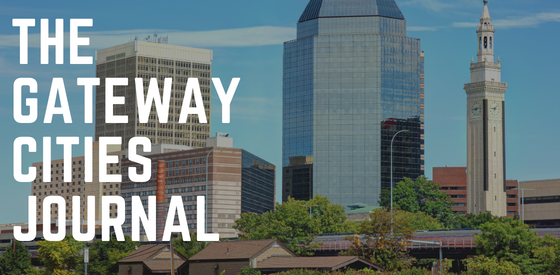Last week, the Gateway City Innovation Institute’s Andre Leroux joined a panel of leaders appearing before the Joint Committee on Economic Development and Emerging Technologies to testify in support of House Bill 228/Senate Bill 130, the Downtown Vitality Act (DTVA). The hearing was called to review omnibus economic development legislation filed by Gov. Healey in March. While the Governor’s bill provides significant investment in the state’s high-flying tech sectors, the package is light on support for small businesses and local economic development. The DVTA is just the right ingredient to help balance out the bill to ensure that it leads to equitable and geographically balanced growth throughout our commonwealth.
Introduced by the chairs of the Gateway Cities Legislative Caucus, Rep. Antonio Cabral and Sen. John Cronin, the DTVA would take some of the sales tax revenue collected from online retailers and invest it in efforts to support local small businesses that are struggling to get by in our downtowns, main streets, and town centers.
By our estimates, the state collects over $51M from online sales each year and this figure is steadily growing. Investing a small share of this revenue in strategic efforts to strengthen local business districts would have outsized economic impact for several reasons.
First, these small businesses have high economic multipliers. The American Express 2022 Small Business Economic Impact Study found that $0.68 of every $1 spent with a local business remains circulating in the local economy, whereas IndieBound.org estimates that less than 6% of Amazon book sales recirculate locally. Second, they are more likely to be owned by immigrants and people of color, creating new wealth and reducing income inequality. Third, and arguably most important to the state’s broader economic development strategy, these small business districts are key to producing more multifamily housing. We need a stronger market for condos and apartments to spur production in areas that haven’t seen residential investment in decades. The more vibrancy we bring to our downtowns, main streets, and towns centers, the more people will want to live in these areas, even if it means forgoing a yard and the two-car garage.
The MassINC Policy Center is working on new research that will show the DVTA is a solid investment for the Commonwealth because the state dollars will have very high leverage. Together with their local business and property owners, cities and towns want to market, promote, and improve their commercials areas, but most have difficulty assembling enough money to get this work going. With modest state support from the DVTA, they will be able to forge ahead with new initiatives, and these efforts will be strong enough to build momentum, so that they can sustain themselves without ongoing state funding.
Last session, the joint committee added the DVTA provisions to Gov. Baker’s economic development bill. Unfortunately, this language didn’t make it into the final package. But support for the DVTA has grown to include MASSCreative, the Massachusetts Cultural Council, the Metropolitan Area Planning Council, and nearly two dozen Gateway City mayors over the past two years.
Sen. Cronin offered amendment #322 to get a jump on the economic development bill and pass the DVTA in the Senate Budget. In a strong show of support, together with 8 additional Senators, nearly a quarter of the Senate signed on to co-sponsor. While the amendment was withdrawn, the additional buzz helps make the case for its inclusion in the economic development bill. If the DVTA passes this summer, instead of just another August sales tax holiday, we’ll have something truly transformative for local retailers to celebrate.
In Other News
Housing & Economic Development
- Chelsea, New Bedford, Pittsfield, Springfield, and Worcester receive grants from the Neighborhood Stabilization Program.
- New Bedford will continue to issue fines to property owners who don’t provide assessors with information.
- Lynn Mayor Jared Nicholson and Salem Mayor Dominick Pangallo call for more state help building affordable housing.
- MHIC and MassHousing announce the opening of the Equitable Developers Fund.
- Providing more food for thought for how Massachusetts can make transformative investments in the Pioneer Valley (as described in a recent MassINC Policy Center report), the Brookings Metro Program releases a study cataloging valuable early learnings from Build Back Better Regional Challenge grant recipients.
- Providing more food for thought for how Massachusetts can help municipalities increase supplier diversity (as described in a 2022 MassINC Policy Center report), the Urban Institute publishes a study of best-practices in state and local inclusive procurement policies.
Transportation
- US Rep. Richard Neal continues to help Springfield’s Union Station with a $4.1 million federal earmark to improve the surrounding streetscape.
- The Berkshire Regional Transit Authority reduces service on some of its bus routes because of a continuing driver shortage.
- The Healey administration awards $37 million in grants to regional transit authorities.
- Are the state’s RTA’s ready for prime time?
Get the latest updates on policy issues impacting Gateways Cities delivered right to your inbox.
The Gateway Cities Innovation Institute strengthens connections across communities and helps Gateway City leaders advance a shared policy agenda.
